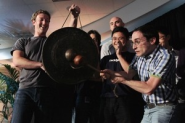-
About
- About Listly
- Community & Support
- Howto
- Chrome Extension
- Bookmarklet
- WordPress Plugin
- Listly Premium
- Privacy
- Terms
- DMCA Copyright
- © 2010-2025 Boomy Labs

 SocialHRCamp
SocialHRCamp
Listly by SocialHRCamp
Do you want to be a part of a globally unprecedented HR UNconference? We are looking for speakers & topic ideas! INTERESTED? HERE'S WHAT YOU NEED TO DO ---> [1] Click "Add Item to List" [2] Select "item WITHOUT a link" [3] Put the topic name in the "Item Name" field [4] In the "Item Note" box: Write a short description of the topic and if you are interested in presenting it yourself. You can also recommend other speakers. Include the relevant Twitter handle & any other social networking links.

How do you dip a toe in with social if your organization is highly regulated? (This might be regulation by industry, or maybe even just by an executive team that doesn't believe in social.)
This session will look at what baby steps an organization can creatively take to build brand awareness and reach job seekers in the social networks. We will also look at how to build the business case for approvals internally.

How are people using Big Data to land big talent?
With video becoming ubiquitous to recruiting, it's unlikely that most departments will have the budget to keep making professional quality videos for employer branding. This session will condense my four years at USC's George Lucas School of Cinema-Television and five years entertainment industry experience into one quick overview of the basics of video pre-production, production, post-production and marketing.

Posted by Jeff Waldman (@JeffWaldmanHR) This session will look at what social recruiting is and is not. We will talk about some of the mainstream social media platforms that will enable recruiters and HR professionals develop new channels for talent attraction. We will also talk about what the role of social recruiting is, other than to attract new talent to your organization. It's important to understand the broader principles and implications of engaging with prospective talent using social media platforms.

We hear it all the time now: entitled, lazy, no sense of responsibility, zero work ethic, always looking to gadgets to find a better way… Yes, that is what the “greatest generation” said about my generation, Baby Boomers, as we entered the workforce in the 1960s and 1970s. And, of course, that is what Boomers and GenXers say about Millennials now.
In this session, we’ll discuss how to break through generational stereotypes to evaluate the individual’s strengths and ensure a good match to culture – regardless of birth generation. We’ll also discuss focusing on commonalities, rather than our differences, in order to better serve the organizational mission.

OK so you don't get it. Why does everyone use the social networks?
Facebook? I don't need to know that you just went to the bathroom.
Twitter? It looks weird. And how can you say anything in 140 characters anyway?
LinkedIn? Sure I use it to hire people, but what good is it for me?
Pinterest? Google+? Who has the time?!?!?!
You aren't the last person who doesn't understand why people are using these networks. There are others. They may not admit it... but there are! Join this discussion to learn the basics about each network. Not even for work, for play! Because if you don't understand why each of these platforms are valuable, it's harder to imagine why you would adopt them for reaching and engaging job seekers.
Don't be left behind!

One of the dirty little secrets of HR – Human Resources as a professional practice – is that it’s not always about the people and humanizing brands. Not really, anyway. Some HR professionals have more in common with the Governance, Risk and Control department of the enterprise. HR sometimes gets [...]

How has looking for worked changed now that social media is around. Are references still as relevant when everything is a Google search away? What does that mean for employers & job seekers?

(Image credit: Getty Images North America via @daylife) Is any relationship ever completely reciprocal? Not really, because one party always wields more power over the other. This is a human behavior dynamic that is tough to ignore, especially when we look deeper at workplace culture and team dynamics. There are [...]

We all know that social media and technology has become a 'must have' in the talent attraction process. But how can companies apply those same principles to their internal communications programs to drive next-generation talent engagement, and remove the barriers traditional communications have introduced?

What is a community? How can it be used in recruiting, retention, employee engagement? How is it being used? How is it different from "talent communities"?
Let's discuss and see how many companies are using existing communities. Let's hear from some who have built talent communities and what they've learned in the process. Let's talk about what your companies and clients are doing that is community but may not be labeled as such and can be leveraged by HR.

Recently, I wrote about employees as brand ambassadors and how they can help – or hurt – an organization's global and social brand. It depends on how well the lines between personal brand and company brand are drawn. Once a company and leadership has the brand issue sorted out, it’s time [...]

Google+ is NOT a social platform it is an important part of the Google Wheel.. join me to learn more...

Why is social media engagement one of the best, most authentic ways to build, develop and strengthen your employment brand? Why is employment branding essential to cutting through the noise and attracting the top talent? How do you build cross-functional programs (e.g., marketing), and enable your entire organization to help build your employment brand?

In world where people are incessantly inundated with marketing messages of all sorts -- not in the least potential employers -- authenticity via social recruiting is a fantastic way to cut through the clutter and set yourself apart, especially in competitive industries like technology.

How one comports oneself via social media can be confusing, especially when it comes to the blurring lines between personal and professional networks. How should one approach this? By creating separate profiles? By using segmentation features on social networks? By not drawing a line?
